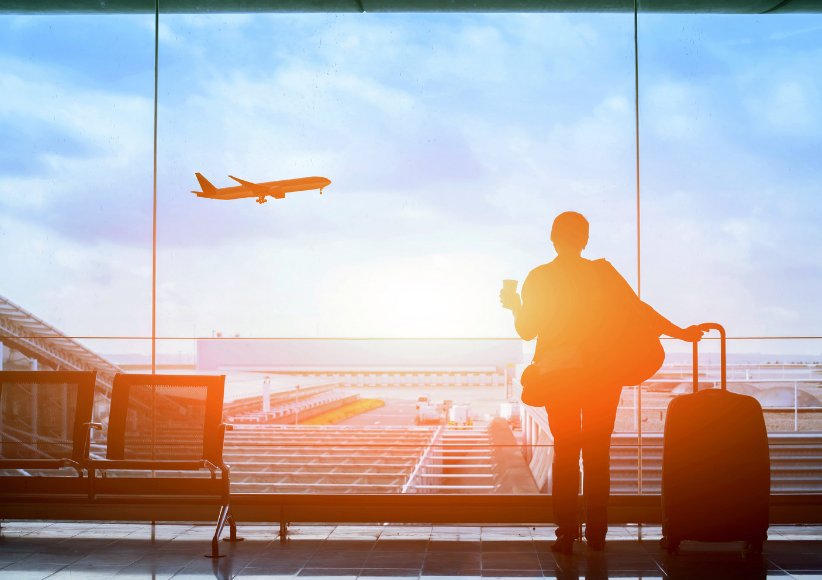Strategy
May 16, 2019
Millennial Travel and Hospitality Personas: The Adventure Seeker

The typical travel and hospitality customer is changing. The millennial share of this market is already significant, and it’s constantly growing. Travel and hospitality organizations must understand different millennial segments’ priorities in order to offer travel options that can win and retain their business for the long term.
This article on the adventure seeker persona is the second of three installments of the Millennial Traveler Personas series, which aims to provide much-needed insights on unique millennial traveler segments. This persona is preceded by the bleisure traveler and will be followed by the hopeful realist, and all three personas are evaluated based on key characteristics of millennial travelers as outlined in the Millennial Travel Behaviors and Attitudes white paper.
To understand an adventure seeker, one must understand FOMO—the ‘fear of missing out.’ Adventure seeker millennials are those who are motivated to explore where they haven’t been before, often to catch up to where their friends have been. Exciting activities, exploration of new terrain, bucket-list destinations, and once-in-a-lifetime experiences all can be found in the adventure seeker’s social media posts.
Take, for example, Alicia the adventure seeker:
Alicia is an active young professional, well-connected with friends around the country and world, and bright-eyed in the hopes of traveling to all seven continents by the age of 30. Ever since studying abroad in college, she has been adding to and crossing off destinations and activities on her bucket list. She always has a trip planned to look forward to—either a short weekend getaway to a city within driving distance or a week-long international trip six months in advance. As she puts it, she comes alive while traveling.
Alicia and her like-minded friends are loyal, tech savvy, social, and experiential—as the other millennial personas are. Yet companies trying to attract adventure seekers should understand their nuanced application of the traits. Namely, their loyalty to brands who provide rewards, their expectation that technology will support their adventures, their inspiration from their networks as shared on social media, and their craving for unique experiences and hidden gems.
Loyal: Seekers of Adventures Funded by Points
Although retail brand loyalty is declining with younger generations, adventure-seeking millennials are still going out of their way to use preferred brands within the travel and hospitality sector. Several millennial consultants at Credera agree that they have chosen two major airlines or alliances and buy almost all of their flights on those, even if the prices are not the lowest options. By constantly accumulating points or redeeming them, the eventual ‘free flights’ fund more adventures and keep these millennials extremely loyal to their reward programs, leading to even more purchases in the future.
While millennials frequently seek unique destinations and one-of-a-kind experiences, even the most adventurous are doing so through familiar brands. Travel and hospitality companies can encourage this behavior by offering rewards tied to experiences. For example, Marriot is now offering Marriot Moments, where reward members can trade points for different categories of destination activities curated by local celebrities and chefs.
The opportunity to use points and perks as fuel for their next big adventure and to enhance the journey along the way will transform thrill-seeking millennials into loyal and consistent customers.
Tech Savvy: Seekers of Seamless Support for Experiences
As travel and hospitality brands acquire more adventurous millennials as loyal customers, they are investing in targeted retention methods that rely on technology. And as the buying power of tech-savvy millennials also grows, more hotels are enabling guests to do everything from signing into their Netflix accounts on the televisions, to keying in to their room via a mobile app—even receiving front desk deliveries via robots. These features engage a generation who grew up during the proliferation of internet-based companies. Adventure seekers, however, take it one step further.
Adventure seekers also want technology that enables deeper experiences on their trips. One adventure seeker we interviewed said that online reviews and downloadable maps are important to her when she’s searching for ancillary experiences near her destination. This access to online and crowdsourced information helps inform the adventure seeker’s decision-making. Another said that being able to split payments for accommodations and experiences is important, since he is often part of a larger group. Travel and hospitality brands can offer in-app integrations with popular review sites or provide digital concierge services that handle the inspiration, selection, and payment of additional experiences.
New technology must do more than simply look flashy. Adventurous millennials will consistently gravitate to travel and hospitality companies that invest in technology that quickly and easily connects them to more meaningful experiences.
Social: Seekers of Social Inspiration to Plan Adventures
Not only are adventure seekers connected to their technology, but they also are very connected to each other and interested in where their networks are exploring. According to research by Expedia and The Center for Generational Kinetics, last year 36% of travelers aged 18 to 21 chose a destination because of the social media posts they had seen. The more adventure seekers see, the more they do and the more they share. Another very adventurous traveler validated the importance of social presence: “I solely use Instagram and blogs to plan my trips out. If a hotel doesn’t have an Instagram, then I’ll look at friends’ photos.” When taking risks on adventurous new experiences, she explains, “At the end of the day, I know that I can always trust the opinion of my friends and family above all else.”
To respond profitably, hotels can increase social presence by launching unique properties with their own Instagram-worthy character or theme. Noteworthy details all contribute to a property’s distinctive atmosphere, prompting guests to snap and share on social media. Especially with suggested hashtags and geo-locations, the likelihood of ‘trending’ increases, and the novelty of the brand attracts a wider audience of connected millennials.
Companies who foster community, experiences, and atmosphere will more frequently find themselves tagged in customers’ posts, and in the process further encourage social sharing and increase brand exposure.
Experiential: Seekers of Local Life and Unique Opportunities
Whether showcased on loyalty reward sites, digital concierge apps, or social networks, the attractions that catch adventure seekers’ eyes are experiential and unique. For lodging, adventure seekers are drawn to Airbnb’s offering to ‘live like a local.’ To compete, hotel management groups are refurbishing old buildings, including former firehouses, factories, candy shops, and train stations, to “offer a more local aesthetic… that is not easily duplicated.” Eccentric hotels have the allure of adventure, especially in contrast to the standard cookie-cutter options.
Hotels are also facilitating experiences by hosting social events. The Residence Inn properties, for example, host ‘Residence Inn Mixes’ three nights a week that include local food trucks, chefs’ dishes, brews, and more. At the millennial-minded Hyatt Centric hotels, concierges share local spots and hidden gems for guests to explore. Even if business travelers don’t have time for grand adventures, area tours and staff-led morning runs can satisfy the FOMO mentality. One of Credera’s adventure-seeking managers explained that if a company brands its product or service as something she can’t find anywhere else, she is more likely to buy.
The adventure seeker is interested in finding unique pop-up opportunities as well as capturing the essence of a location. Travel and hospitality brands that create opportunities for local or exclusive experiences will likely see a rise in loyal millennial adventure seekers.
Adventure Seekers Snapshot
How to win their business: Provide or support experiences that are exciting and unique.
Millennials in general are loyal, tech savvy, social, and experiential, but companies can be more effective when targeting the adventure seeker’s specific expression of those traits. The people who align to this persona respond more to brands who provide unique experiences in exchange for loyalty. On adventure trips, these millennials expect to access technology on the go to smoothly take care of logistics and afford more time for accomplishing bucket lists. Adventure seekers trust their social networks more than direct advertising, so brands who foster organic engagement through the adventure seekers’ existing social circles will more effectively inspire followers. Ultimately, the more the experience is specific to the location and non-repeatable, the more the travel and hospitality company will win the adventure seeker’s business.
As technology continues to advance and the millennial generation’s purchasing power continues to rise, the potential for companies to innovate and meet millennial’s needs and wants is immense. Businesses who ignore or misunderstand the adventure seeker’s insatiable desires and behaviors will end up missing out on profits and advancement. And that kind of FOMO is relatable for businesspeople of all generations.
Learn More
Want to learn more about how you can clarify your target audience? Interested in personalizing your customer journey around select customer segments? Reach us marketing@credera.com, and we’d be happy to help.
Contact Us
Ready to achieve your vision? We're here to help.
We'd love to start a conversation. Fill out the form and we'll connect you with the right person.
Searching for a new career?
View job openings
